静态动词与动态动词
动态和静态动词
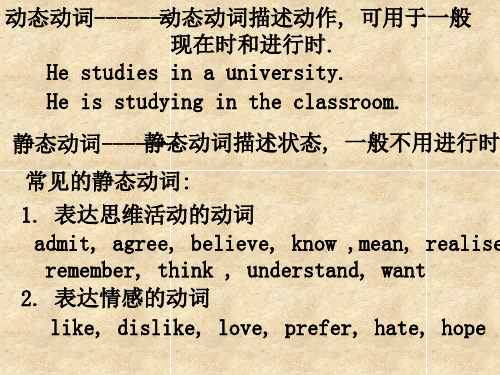
He studies in a university. He is studying in the classroom.
静态动词----静--态- 动词描述状态, 一般不用进行时
常见的静态动词:
1. 表达思维活动的动词 admit, agree, believe, know ,mean, realise remember, think , understand, want
He is tasting the soup.
闻起来有…味 + adj. smell
闻 The meat smells good.
The room smells damp.
They can smell the gas.
He is smelling the meat.
看起来…. look 看
+ adj.
有 have
吃, 开, 喝…
We have a second-hand car. She is having some tea. ( drink )
They are having a sports meeting.
认为 think
想/ 考虑/思考 I think it’s a great idea. Do you think they will come? I’m thinking about my exam.
What are you thinking ? 感觉到/ 摸起来 + adj.
feel 觉得/ 感到
I feel tired.
They feel they need more tome. ( 认为 )
关于英语动态动词语静态动词的用法(吉林)

关于英语动态动词与静态动词的用法李丽华(鞍山师范学院外语系鞍山114005)摘要:本文从英语动态动词和静态动词的分类入手,根据分析和比较的结果,系统地阐述动态动词和静态动词的用法。
关键词:动态动词静态动词Abstract: This thesis elaborates the usage of the English dynamic and stative verbs systematically and focusses the attention on the accurate use of various verbs in the Englishlanguage.Key Wrds: Dynamic verbs Stative verbs英语中的动态动作和静态状态可以表现在动词中,从语义角度讲,动词可以分为动态和静态。
本文着重就动态动词(dynamic verbs)和静态动词(stative verbs)的语义和句法特征做进一步的分析。
一、动词(dynamic verbs)和静态动词(stative verbs)的概念及分类。
实义动词按其语义特征可以分为动态动词和静态动词。
1.动态动词(dynamic verbs):表示运动状态的动词。
这类动词分为五种:(1)活动动词(activity verbs)(2)过程动词(process verbs)(3)感觉动词(verbs of bodily sensation)(4)过渡性动词(transitional verbs)(5)瞬间动词(momentary verbs)2.静态动词(stative verbs):表示相对静止状态的动词。
这类动词分为三种:(1)感觉动词(verbs of perception)(2)认识动词(verbs of cogition)(3)关系动词(relation verbs)二、动态动词(dynamic verbs)1.活动动词(activity verbs):这类动词表示动作的发出者的有意识的,主动的行为。
日语动词四大体总结
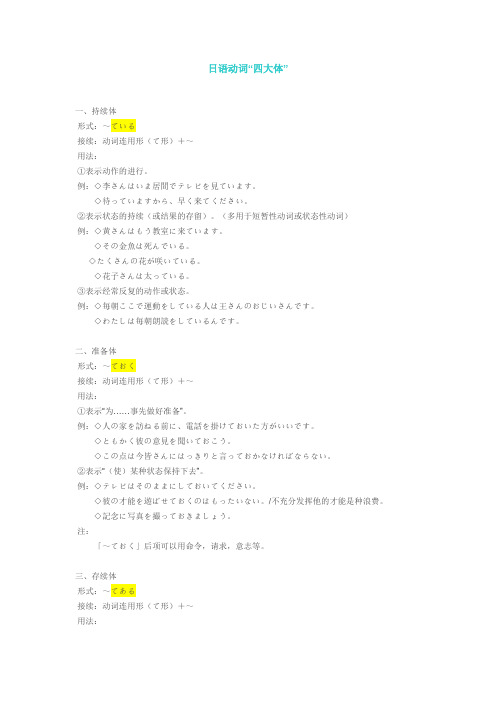
日语动词“四大体”一、持续体形式:~ている接续:动词连用形(て形)+~用法:①表示动作的进行。
例:◇李さんはいま居間でテレビを見ています。
◇待っていますから、早く来てください。
②表示状态的持续(或结果的存留)。
(多用于短暂性动词或状态性动词)例:◇黄さんはもう教室に来ています。
◇その金魚は死んでいる。
◇たくさんの花が咲いている。
◇花子さんは太っている。
③表示经常反复的动作或状态。
例:◇毎朝ここで運動をしている人は王さんのおじいさんです。
◇わたしは毎朝朗読をしているんです。
二、准备体形式:~ておく接续:动词连用形(て形)+~用法:①表示“为……事先做好准备”。
例:◇人の家を訪ねる前に、電話を掛けておいた方がいいです。
◇ともかく彼の意見を聞いておこう。
◇この点は今皆さんにはっきりと言っておかなければならない。
②表示“(使)某种状态保持下去”。
例:◇テレビはそのままにしておいてください。
◇彼の才能を遊ばせておくのはもったいない。
/不充分发挥他的才能是种浪费。
◇記念に写真を撮っておきましょう。
注:「~ておく」后项可以用命令,请求,意志等。
三、存续体形式:~てある接续:动词连用形(て形)+~用法:①表示动作结果的存续,主语是动作涉及的对象,即他动词的宾语。
例:◇壁に地図が掛けてあります。
◇庭には木が植えてある。
◇窓が開けてあります。
注:A、表示现在的状态后项不用过去时。
B、动词前面的助词用「が」、不用「を」。
C、主语是物。
②表示已做好了某事或做过了某事。
例:◇電話を掛けて、いくと言ってあるから、待っているだろう。
◇すみません、李さんと約束をしてありますから。
◇宿題はもうしてあります。
注:A、表示现在的状态后项不用过去时。
B、动词前面的助词可以用「を」。
C、主语是一般是人。
四、完成体形式:~てしまう/~でしまう接续:动词连用形(て形)+~用法:①表示一种动作的完了。
例:◇その小説は一日で読んでしまった。
◇両親からもらったお金はみな使ってしまった。
动态动词与静态动词
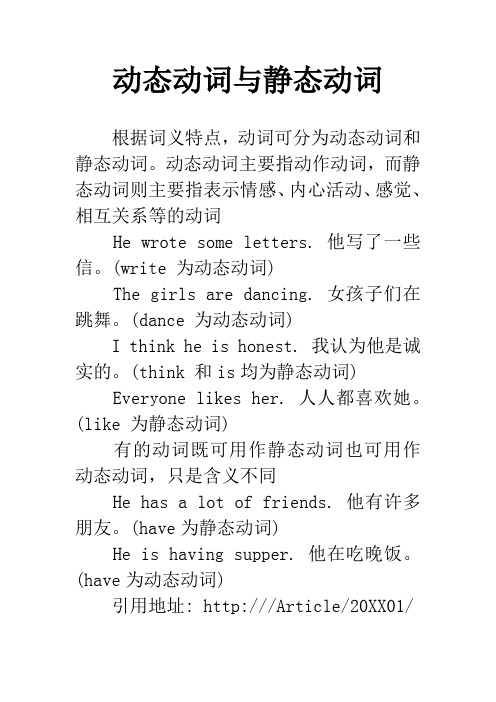
动态动词与静态动词
根据词义特点,动词可分为动态动词和静态动词。
动态动词主要指动作动词,而静态动词则主要指表示情感、内心活动、感觉、相互关系等的动词
He wrote some letters. 他写了一些信。
(write 为动态动词)
The girls are dancing. 女孩子们在跳舞。
(dance 为动态动词)
I think he is honest. 我认为他是诚实的。
(think 和is均为静态动词)
Everyone likes her. 人人都喜欢她。
(like 为静态动词)
有的动词既可用作静态动词也可用作动态动词,只是含义不同
He has a lot of friends. 他有许多朋友。
(have为静态动词)
He is having supper. 他在吃晚饭。
(have为动态动词)
引用地址: http:///Article/20XX01/。
静态动词
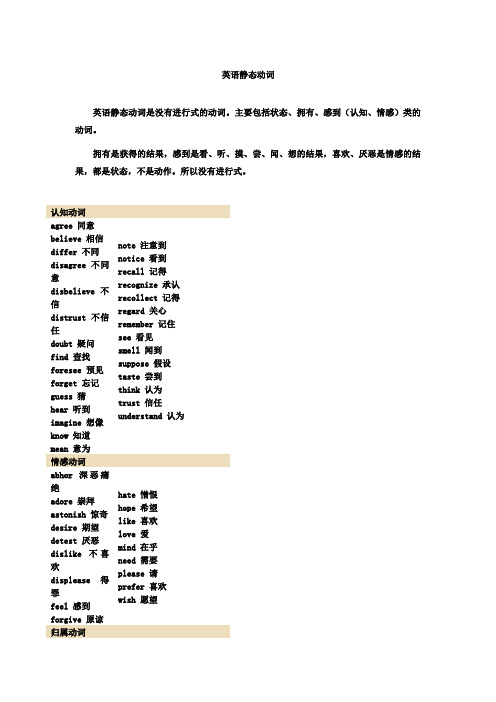
英语静态动词英语静态动词是没有进行式的动词。
主要包括状态、拥有、感到(认知、情感)类的动词。
拥有是获得的结果,感到是看、听、摸、尝、闻、想的结果,喜欢、厌恶是情感的结果,都是状态,不是动作。
所以没有进行式。
认知动词agree 同意believe 相信differ 不同disagree 不同意disbelieve 不信distrust 不信任doubt 疑问find 查找foresee 预见forget 忘记guess 猜hear 听到imagine 想像know 知道mean 意为note 注意到notice 看到recall 记得recognize 承认recollect 记得regard 关心remember 记住see 看见smell 闻到suppose 假设taste 尝到think 认为trust 信任understand 认为情感动词abhor 深恶痛绝adore 崇拜astonish 惊奇desire 期望detest 厌恶dislike 不喜欢displease 得罪feel 感到forgive 原谅hate 憎恨hope 希望like 喜欢love 爱mind 在乎need 需要please 请prefer 喜欢wish 愿望归属动词这里列举的不是全部,只是最常用的。
主动词按其基本词汇意义可以分为动态动词(Dynamic Verb)和静态动词(Stative Verb)。
静态动词表示一种静止状态,包括“存在”和“拥有”的动词,如be,have, own, belong, exist, hold(容纳)等;表示度量的动词,如cost, weigh, measure 等;表示五官感觉的动词,如see, hear, taste, smell, feel 等;以及 表示心理状态的动词,如 believe, think, know, remember, forget, understand, love, like ,hate, detest(讨厌)等。
静态动词与动态动词
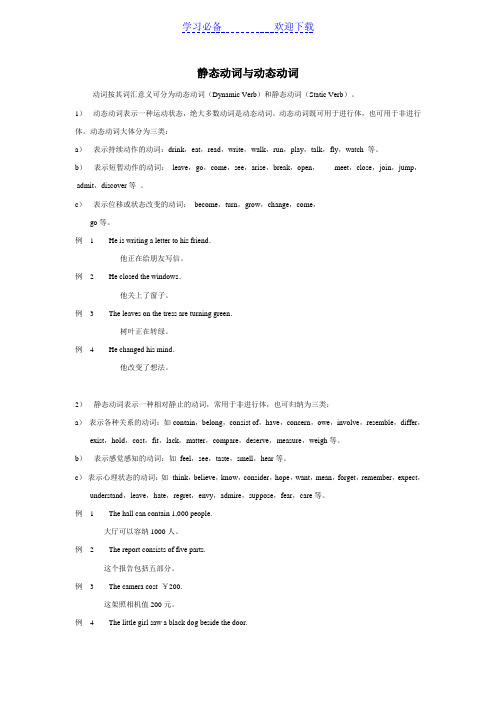
静态动词与动态动词动词按其词汇意义可分为动态动词(Dynamic Verb)和静态动词(Static Verb)。
1)动态动词表示一种运动状态,绝大多数动词是动态动词。
动态动词既可用于进行体,也可用于非进行体。
动态动词大体分为三类:a)表示持续动作的动词:drink,eat,read,write,walk,run,play,talk,fly,watch 等。
b)表示短暂动作的动词:leave,go,come,see,arise,break,open,meet,close,join,jump,admit,discover等。
c)表示位移或状态改变的动词:become,turn,grow,change,come,go等。
例 1 He is writing a letter to his friend.他正在给朋友写信。
例 2 He closed the windows.他关上了窗子。
例 3 The leaves on the tress are turning green.树叶正在转绿。
例 4 He changed his mind.他改变了想法。
2)静态动词表示一种相对静止的动词,常用于非进行体,也可归纳为三类:a)表示各种关系的动词:如contain,belong,consist of,have,concern,owe,involve,resemble,differ,exist,hold,cost,fit,lack,matter,compare,deserve,measure,weigh等。
b)表示感觉感知的动词:如feel,see,taste,smell,hear等。
c)表示心理状态的动词:如think,believe,know,consider,hope,want,mean,forget,remember,expect,understand,leave,hate,regret,envy,admire,suppose,fear,care等。
“动词的时态和语态”及“为谓语动词易错点开处方”

动词的时态和语态关于动词动词的学习必须掌握好关于动词的基本概念1. 根据动词后面能否接宾语,可分为:及物动词和不及物动词及物动词:后面必须带有宾语成分,如:find, buy, send, make, see等。
不及物动词:动词后面不能接宾语,但可以接状语。
如:come, last, happen, sit, break out等。
2. 根据动词的动作能否持续,可分为:延续性动词和非延续性动词延续性动词:动词的动作可以持续一段时间。
如: live, wait, sit, study, sleep等。
非延续性动词:动词的动作不能持续,一发生就结束,故这样的动词不能与表示一段时间的状语连用。
如: stop, join, turn off, begin, buy等。
3. 根据动词的动作发生有无明显动作特征,可分为:动态动词和静态动词动态动词:动词的动作发生时,有明显的动作出现。
如: write, walk, smile, run, speak等。
静态动词:动词的动作发生时处于静止状态。
如: sit, stand, lie, sleep等。
4. 根据动词在句中充当的成分,可分为:谓语动词和非谓语动词谓语动词:在句子中充当谓语的动词形式。
它有人称、数、时态、语态、语气等不同的变化。
如: begins, wrote, (will) go, (have) read等。
非谓语动词:动词充当谓语动词之外的其他成分时的形式。
它包括动词不定式、动词ing 形式和动词过去分词三种形式。
如: to help, being built, written等。
5. 根据动词与其他词结合的特点,可分为:动词短语和短语动词动词短语:动词与其他词构成的短语,各词在短语中保持自己的意义。
这样的词组可以在中间插入其他词,也可拆分。
如: think over, find out, live in等。
短语动词:动词和其他词构成的一个新的动词,这样的词组只有一个整体意义,故不可拆分。
关于静态动词和动态动词,以及延续性动词和短暂动词
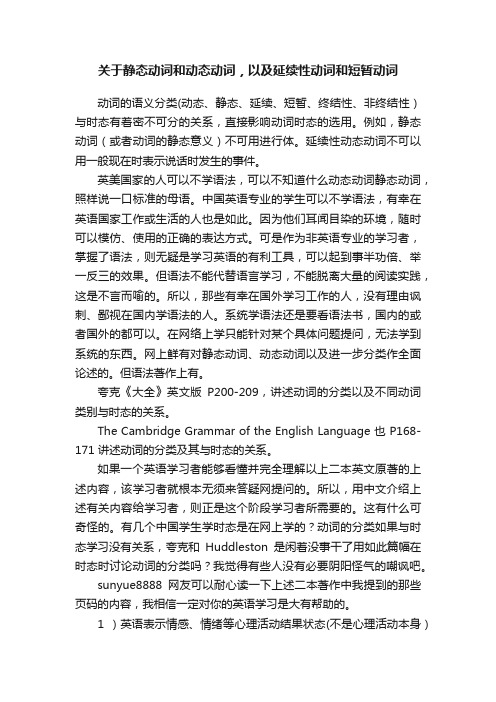
关于静态动词和动态动词,以及延续性动词和短暂动词动词的语义分类(动态、静态、延续、短暂、终结性、非终结性)与时态有着密不可分的关系,直接影响动词时态的选用。
例如,静态动词(或者动词的静态意义)不可用进行体。
延续性动态动词不可以用一般现在时表示说话时发生的事件。
英美国家的人可以不学语法,可以不知道什么动态动词静态动词,照样说一口标准的母语。
中国英语专业的学生可以不学语法,有幸在英语国家工作或生活的人也是如此。
因为他们耳闻目染的环境,随时可以模仿、使用的正确的表达方式。
可是作为非英语专业的学习者,掌握了语法,则无疑是学习英语的有利工具,可以起到事半功倍、举一反三的效果。
但语法不能代替语言学习,不能脱离大量的阅读实践,这是不言而喻的。
所以,那些有幸在国外学习工作的人,没有理由讽刺、鄙视在国内学语法的人。
系统学语法还是要看语法书,国内的或者国外的都可以。
在网络上学只能针对某个具体问题提问,无法学到系统的东西。
网上鲜有对静态动词、动态动词以及进一步分类作全面论述的。
但语法著作上有。
夸克《大全》英文版P200-209,讲述动词的分类以及不同动词类别与时态的关系。
The Cambridge Grammar of the English Language 也 P168-171 讲述动词的分类及其与时态的关系。
如果一个英语学习者能够看懂并完全理解以上二本英文原著的上述内容,该学习者就根本无须来答疑网提问的。
所以,用中文介绍上述有关内容给学习者,则正是这个阶段学习者所需要的。
这有什么可奇怪的。
有几个中国学生学时态是在网上学的?动词的分类如果与时态学习没有关系,夸克和Huddleston是闲着没事干了用如此篇幅在时态时讨论动词的分类吗?我觉得有些人没有必要阴阳怪气的嘲讽吧。
sunyue8888网友可以耐心读一下上述二本著作中我提到的那些页码的内容,我相信一定对你的英语学习是大有帮助的。
1 )英语表示情感、情绪等心理活动结果状态(不是心理活动本身)的动词,都属于静态动词。
静态动词和动态动词区别(12月20日)
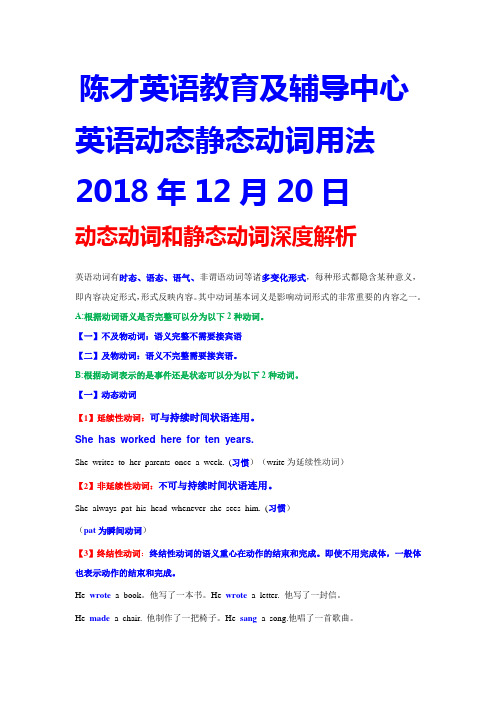
陈才英语教育及辅导中心英语动态静态动词用法2018年12月20日动态动词和静态动词深度解析英语动词有时态、语态、语气、非谓语动词等诸多变化形式,每种形式都隐含某种意义,即内容决定形式,形式反映内容。
其中动词基本词义是影响动词形式的非常重要的内容之一。
A:根据动词语义是否完整可以分为以下2种动词。
【一】不及物动词:语义完整不需要接宾语【二】及物动词:语义不完整需要接宾语。
B:根据动词表示的是事件还是状态可以分为以下2种动词。
【一】动态动词【1】延续性动词:可与持续时间状语连用。
She has worked here for ten years.She writes to her parents once a week. (习惯)(write为延续性动词)【2】非延续性动词:不可与持续时间状语连用。
She always pat his head whenever she sees him. (习惯)(pat为瞬间动词)【3】终结性动词:终结性动词的语义重心在动作的结束和完成。
即使不用完成体,一般体也表示动作的结束和完成。
He wrote a book。
他写了一本书。
He wrote a letter. 他写了一封信。
He made a chair. 他制作了一把椅子。
He sang a song.他唱了一首歌曲。
备注:终结性动词的动作如果没有结束,则需要使用进行体:He was writing a letter. 他在写一封信。
He was making a chair.他在制作一把椅子。
【4】非终结性动词:表示非终结动词没有终结意义动词。
He wrote for two hours.他写了4小说。
He was writing.他在写作。
He wrote till 6 o'clock. 他一直写到6点钟。
【5】状态转换动词:表示转换为习惯意义的动词。
More and more people die of cancers. (习惯)(die为转态动词)越来越多的人死于癌症。
静态动词与动态动词
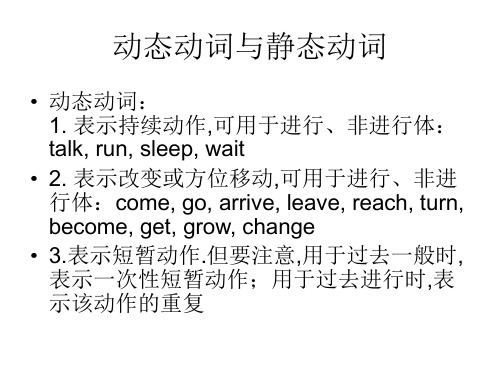
这类动词有hear, learn, tell, say, gather 等: I hear that a big shot is coming to our university.
• She tells me you’re entering for the competition / examination. • 历史现在时:p. 127
• It was the first / the second time that he had turned on his father.
动词:宾语的种类
• A. beat the drum / a boy; beat a retreat / beat time / beat the record / beat one’s brains.
一般过去时
• 1. 表示过去一次性或习惯性动作:p. 128 • 2. 表示现在和将来: • 1want, hope, think , wonder等几个动词用于过去
时可表示委婉语气:I wondered if you could spare me a few minutes. / I hoped you could come here. Suppose we lunched on porridge made with lean meat and preserved egg? • 2> 用于某些固定结构中:I wish the Campus were not so far away from GZ. / It’s high time that you went to bed. / If only I had enough money now./ He looks as if he was ill. / He treats the children as if they were his own.
部分静态动词典型静态、动态意义对照
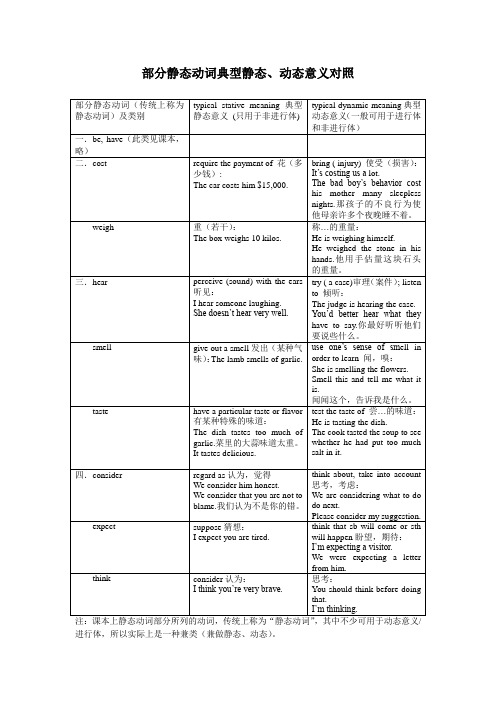
She doesn’t hear very well.
try ( a case)审理(案件); listen to倾听:
The judge is hearing the case.
You’d better hear what they have to say.你最好听听他们要说些什么。
I’m expecting a visitor.
We were expecting a letter from him.
think
consider认为:
I think you’re very brave.
思考:
You should think before doing that.
I’m thinking.
闻闻这个,告诉我是什么。
taste
have a particular taste or flavor有某种特殊的味道:
The dish tastes too much of garlic.菜里的大蒜味道太重。
It tastes delicious.
test the taste of尝…的味道:
He is tasting the dish.
weigh
重(若干):
The box weighs 10 kilos.
称…的重量:
He is weighing himself.
He weighed the stone in his hands.他用手估量这块石头的重量。
三.hear
perceive (sound) with the ears听见:
The car costs him $15,000.
bring ( injury)使受(损害):
《动态和静态动词》课件

2 强调状态
静态动词强调状态。
例子
1 He runs every day.
他每天都跑步。
2 He is tired today.
他今天很累。
总结
1 动态动词和静态动词是英语中两种不同的动词类型。 2 动态动词强调动作,静态动词强调状态。 3 运用动态和静态动词能使表达更准确生动。
《动态和静态动词》PPT 课件
动态和静态动词是英语中两种不同的动词类型。动态动词强调动作,静态动 词强调状态。正确运用动态和静态动词可以使表达更加准确和生动。
什么是动态动词?
1 描述动作或事件
动态动词描述一个动作或 者事件。
2 具有时态功能
3 例子
可以用来构成一般现在时、 一般过去时、一般将来时 等时态。
run(跑)、eat(吃) 、play(玩)、dance( 跳舞)等
什么是静态动词?
1 描述状态、性质、感 2 不具有时态功能
3 例子
觉等
只有一般现在时和一般过
be(是)、seem(似乎
静态动词描述状态、性质、去时两种。)、appear(出现)、
感觉等。
feel(感觉)等
动态和静态动词的区别
1 强调动作
动态动词和静态动词daynamic and stative verbs
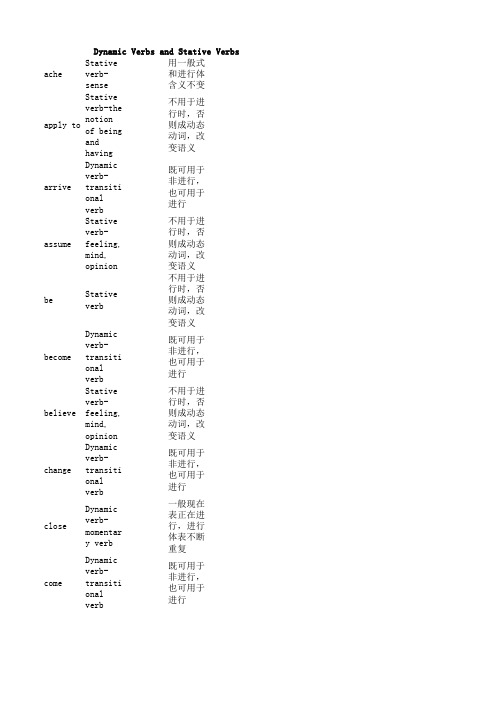
Dynamic Verbs and Stative Verbsache Stative verb-sense用一般式和进行体含义不变apply to Stative verb-the not不用于进行时,否则成动态动词,改变语义arrive Dynamic verb-transit既可用于非进行,也可用于进行assume Stative verb-feeling不用于进行时,否则成动态动词,改变语义be Stative verb不用于进行时,否则成动态动词,改变语义become Dynamic verb-transit既可用于非进行,也可用于进行believe Stative verb-feeling不用于进行时,否则成动态动词,改变语义change Dynamic verb-transit既可用于非进行,也可用于进行close Dynamic verb-momenta一般现在表正在进行,进行体表不断重复come Dynamic verb-transit既可用于非进行,也可用于进行consider Stative verb-feeling不用于进行时,否则成动态动词,改变语义cost Stative verb-the not不用于进行时,否则成动态动词,改变语义detest Stative verb-feeling不用于进行时,否则成动态动词,改变语义differ from Stative verb-the not不用于进行时,否则成动态动词,改变语义drink Dynamic verb-durativ既可用于非进行,也可用于进行eat Dynamic verb-durativ既可用于非进行,也可用于进行fear Stative verb-feeling不用于进行时,否则成动态动词,改变语义feel Stative verb-sense用一般式和进行体含义不变fit Stative verb-the not不用于进行时,否则成动态动词,改变语义fly Dynamic verb-durativ既可用于非进行,也可用于进行get Dynamic verb-transit既可用于非进行,也可用于进行go Dynamic verb-transit既可用于非进行,也可用于进行grow Dynamic verb-transit既可用于非进行,也可用于进行hate Stative verb-feeling不用于进行时,否则成动态动词,改变语义have Stative verb不用于进行时,否则成动态动词,改变语义hear Stative verb-sense不用于进行时,否则成动态动词,改变语义hit Dynamic verb-momenta一般现在表正在进行,进行体表不断重复hold Stative verb-the not不用于进行时,否则成动态动词,改变语义hurt Stative verb-sense用一般式和进行体含义不变imagine Stative verb-feeling不用于进行时,否则成动态动词,改变语义jump Dynamic verb-momenta一般现在表正在进行,进行体表不断重复kick Dynamic verb-momenta一般现在表正在进行,进行体表不断重复knock Dynamic verb-momenta一般现在表正在进行,进行体表不断重复know Stative verb-feeling不用于进行时,否则成动态动词,改变语义lack Stative verb-the not不用于进行时,否则成动态动词,改变语义lack Stative verb-the not不用于进行时,否则成动态动词,改变语义leave Dynamic verb-transit既可用于非进行,也可用于进行like Stative verb-feeling不用于进行时,否则成动态动词,改变语义love Stative verb-feeling不用于进行时,否则成动态动词,改变语义mean Stative verb-feeling不用于进行时,否则成动态动词,改变语义measure Stative verb-the not不用于进行时,否则成动态动词,改变语义mind Stative verb-feeling不用于进行时,否则成动态动词,改变语义notice Stative verb-feeling不用于进行时,否则成动态动词,改变语义open Dynamic verb-momenta一般现在表正在进行,进行体表不断重复play Dynamic verb-durativ既可用于非进行,也可用于进行prefer Stative verb-feeling不用于进行时,否则成动态动词,改变语义put Dynamic verb-momenta一般现在表正在进行,进行体表不断重复rain Dynamic verb-durativ既可用于非进行,也可用于进行reach Dynamic verb-transit既可用于非进行,也可用于进行read Dynamic verb-durativ既可用于非进行,也可用于进行regret Stative verb-feeling不用于进行时,否则成动态动词,改变语义remember Stative verb-feeling不用于进行时,否则成动态动词,改变语义resemble Stative verb-the not不用于进行时,否则成动态动词,改变语义run Dynamic verb-durativ既可用于非进行,也可用于进行see Stative verb-sense不用于进行时,否则成动态动词,改变语义shut Dynamic verb-momenta一般现在表正在进行,进行体表不断重复sit Dynamic verb-durativ既可用于非进行,也可用于进行sleep Dynamic verb-durativ既可用于非进行,也可用于进行smell Stative verb-sense不用于进行时,否则成动态动词,改变语义stand Dynamic verb-durativ既可用于非进行,也可用于进行suppose Stative verb-feeling不用于进行时,否则成动态动词,改变语义take out Dynamic verb-momenta一般现在表正在进行,进行体表不断重复talk Dynamic verb-durativ既可用于非进行,也可用于进行taste Stative verb-sense不用于进行时,否则成动态动词,改变语义think Stative verb-feeling不用于进行时,否则成动态动词,改变语义think Stative verb-feeling不用于进行时,否则成动态动词,改变语义turn Dynamic verb-transit既可用于非进行,也可用于进行understand S tative verb-feeling不用于进行时,否则成动态动词,改变语义want Stative verb-feeling不用于进行时,否则成动态动词,改变语义watch Dynamic verb-durativ既可用于非进行,也可用于进行weigh Stative verb-the not不用于进行时,否则成动态动词,改变语义wish Stative verb-feeling不用于进行时,否则成动态动词,改变语义work Dynamic verb-durativ既可用于非进行,也可用于进行write Dynamic verb-durativ既可用于非进行,也可用于进行。
静态动词

静态动词英语静态动词是没有进行式的动词。
主要包括状态、拥有、感到(认知、情感)类的动词。
拥有是获得的结果,感到是看、听、摸、尝、闻、想的结果,喜欢、厌恶是情感的结果,都是状态,不是动作。
所以没有进行式。
主动词按其基本词汇意义可以分为动态动词(Dynamic Verb)和静态动词(Stative Verb)。
静态动词表示一种静止状态,包括“存在”和“拥有”的动词,如be, have, own, belong, exist, hold(容纳)等;含有静态动词be和have意义的动词,如apple to(适用于),belong to,differ from,cost,weigh,measure,fit(适合),hold(可容纳),lack,resemble等。
例如:表示度量的动词,如cost, weigh, measure等;表示五官感觉的动词,如see, hear, taste, smell, fell等;表示心理状态的动词,如 believe, think, know, remember, forget, understand, love,like ,hate, detest(讨厌)等。
静态动词的最主要语法特征是不用于进行体,若用进行体往往会改变含义,即变成了动态动词。
例如:He is being foolish(=is acting foolishly).We’re having a wonderful time (=are enjoying ourselves).比较:He resembles his father.He is resembling his father (=is becoming more and more like his father as the years go by.This camera costs 140 dollars.This mistake is costing us dearly (=is bringing great injury to us).当表示感觉的动词用于表示主动含义时,便是动态动词。
转换
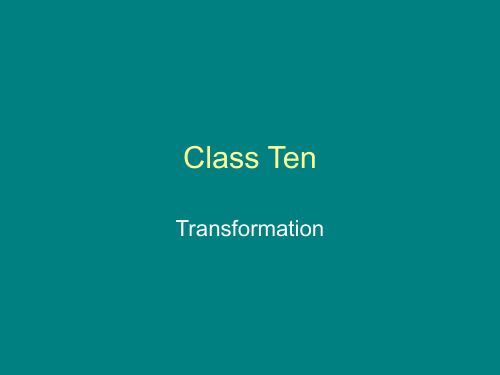
春天没有语言,只有淅飒和低吟。春花怒放, 春叶茁发,春水奔流,春天欢腾地、无休止地 追逐着,这一切比言语要丰富的多。
2.英语中由名次派生的动词或名词转用的动 词转换成汉语名词
The novel satirizes the marriage of convenience. 这部小说是对建立在利害关系基础上的婚姻的讽刺。 3. 英语介词和副词转换成汉语动词 The sea thundered on, over and past, and as it roared by it revealed a hideous sight.
她现在可能意识到了这一点:那些过去使她羞 愧的无地自容的东西——人们对她处境的关 心——不过是建立在一种幻觉上。
3.从内容转换到形式 My supporters were mostly young, and newcomers to politics. 我的支持者大多是年轻人,政治上初出茅庐的人。 我的支持者大多是政治上初出茅庐的年轻人。 He wished to try his luck by inviting the beautiful, young lady to dance, but met with a rebuff. 他想试试运气,请那位年轻貌美的女士跳舞,结果 碰了一鼻子灰。
海浪狂啸着滚来,如泰山压顶一半,又怒吼着 滚远,巨浪过处,一片狼藉。 五、语态转换 英语中被动语态出现的频率远远多于汉语,在英 译汉时,常常将被动语态转换成汉语主动语态, 使译文更符合汉语的语言习惯。 英语句子的被动含义有两种表示方式,一种有 形式标志,主动词be+过去分词+by;另一种 没有形式标志,仅靠句子的语义逻辑,用主动 的形势表示被动的含义。
人们不久就认识到,这种办法提供了解决问题 的最佳框架。
动态性动词和静态性动词

动态性动词和静态性动词动态性动词与静态性动词(1)Dynamic Verb and Static Verb英语动词按其是否可以用于进行时态的语义特征,可以分为动态性动词和静态性动词。
大量的动词是动态性的,可以用于进行时态。
有一些动词是静态性的,不能用于进行时态。
还有不少动词,兼有动态与静态两种特性,而其含义是不同的。
动态性动词与静态性动词的用法有四个不同之处:(1)动态性动词可用于进行时态,而静态性动词则不可。
这是两种动词最根本的区别,例如:1)John is writing to his father.(约翰正在给他的父亲写信。
)2)John resembles his father.(约翰长得像他的父亲。
)John is resembling his father.(Impossible)3)John is painting his house.(约翰正在油漆他的房子。
)4)John owns a house.(约翰拥有一所房子。
)John is owning a house.(Impossible)有些动词可兼作两类动词,但意思不同。
动词“hold”的句子主语是人,则作“握住”解,是个动态性动同;句子主语是处所,则作“容纳”解,是个静态性动词,例如:5)a.John is holding a ball in his hands.b.John has a ball in his hands.(约翰正用两手握住球。
)6)a.The bus holds 50 people.b.50 people can sit in the bus.(这辆公共汽车能坐五十人。
)动词have可兼作两种类型。
当作动态性动词用时,表示动作的发生或过程,相当于take,get,receive,eat,drink等词,可用于进行时态。
当作静态性动词用时,表示“拥有”的概念,相当于own,possess等词,没有进行时态,例如:7)a.I was having my coffee quietly.b.I was drinking my coffee quietly.(当时我正在默默地喝咖啡。
终结性动词、非终结性动词、持续性非终结性动词等名词解释
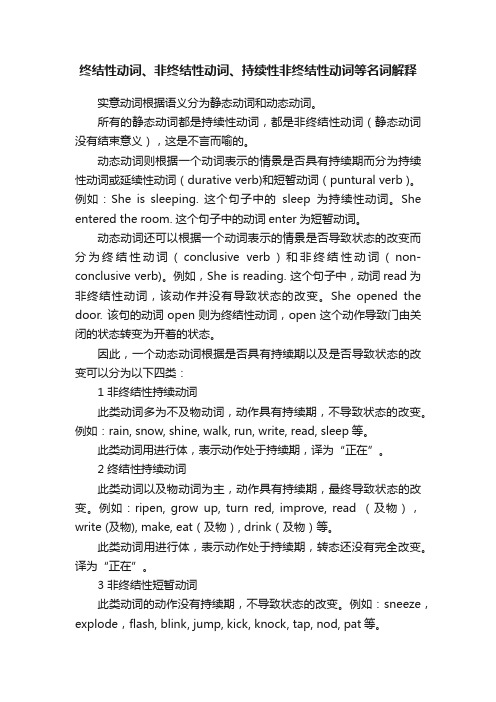
终结性动词、非终结性动词、持续性非终结性动词等名词解释实意动词根据语义分为静态动词和动态动词。
所有的静态动词都是持续性动词,都是非终结性动词(静态动词没有结束意义),这是不言而喻的。
动态动词则根据一个动词表示的情景是否具有持续期而分为持续性动词或延续性动词(durative verb)和短暂动词(puntural verb )。
例如:She is sleeping. 这个句子中的sleep为持续性动词。
She entered the room. 这个句子中的动词enter为短暂动词。
动态动词还可以根据一个动词表示的情景是否导致状态的改变而分为终结性动词(conclusive verb)和非终结性动词(non-conclusive verb)。
例如,She is reading. 这个句子中,动词read为非终结性动词,该动作并没有导致状态的改变。
She opened the door. 该句的动词open则为终结性动词,open这个动作导致门由关闭的状态转变为开着的状态。
因此,一个动态动词根据是否具有持续期以及是否导致状态的改变可以分为以下四类:1 非终结性持续动词此类动词多为不及物动词,动作具有持续期,不导致状态的改变。
例如:rain, snow, shine, walk, run, write, read, sleep等。
此类动词用进行体,表示动作处于持续期,译为“正在”。
2 终结性持续动词此类动词以及物动词为主,动作具有持续期,最终导致状态的改变。
例如:ripen, grow up, turn red, improve, read (及物),write (及物), make, eat(及物), drink(及物)等。
此类动词用进行体,表示动作处于持续期,转态还没有完全改变。
译为“正在”。
3 非终结性短暂动词此类动词的动作没有持续期,不导致状态的改变。
例如:sneeze,explode,flash, blink, jump, kick, knock, tap, nod, pat等。
- 1、下载文档前请自行甄别文档内容的完整性,平台不提供额外的编辑、内容补充、找答案等附加服务。
- 2、"仅部分预览"的文档,不可在线预览部分如存在完整性等问题,可反馈申请退款(可完整预览的文档不适用该条件!)。
- 3、如文档侵犯您的权益,请联系客服反馈,我们会尽快为您处理(人工客服工作时间:9:00-18:30)。
• 静态动词用于进行体时,则成了动态动词, 意义有所不同: He’s being polite today. • They were having a party. • He is resembling his father. • The chef is tasting the soup. • Please be quiet. I’m thinking. • I’m hoping you can make an exception to the children.
• 静态动词: • 表示一种状态,通常用于非进行体;若用进行体, 语义不同. • 1. be, have • 2. 含有be和have 意义的词,如 apply to, belong to, differ from, cost, weight, measure, fit, hold, lack, resemble • 3. 表示感觉的动词:feel, hear, see, smell, taste • 4. 表心理或情感状态的动词:believe, assume, consider, detest, fear, know, like, love, mean, mind, notice, prefer, remember
动词的时、体、态
• • • • • • 1. 两种时间:现在和过去 2.两种体:进行体和完成体 3. 结合: 现在:一般,进行,完成,完成进行 过去:一般,进行,完成,完成进行 4. 语态:主动和被动; be型被动态和get型 被动态
一般现在时
• 1. 表示不受时限的客观存在(真理、格言、科学 事实等) • 2. 表示习惯性经常性的动作 • 3. 表示现时的状态和现在瞬间动作:What’s the matter with you? You look pale. / What do you think? • 常用于体育的现场报道、戏法表演、操作演示的 解说词中(见教材) • 也用于一些习惯性的用法中:I declare the conference open. / I wish you all the best.
• 2. 注意下列用法: 1) It’s ok since I had it fixed. • 2) Things are much worse since you left. 3) I feel / am feeling much better since I took the medicine. • 4) My health is much improved since I gave up smoking.
动态动词与静态动词
• 动态动词: 1. 表示持续动作,可用于进行、非进行体: talk, run, sleep, wait • 2. 表示改变或方位移动,可用于进行、非 进行体:come, go, arrive, leave, reach, turn, become, get, grow, change • 3.表示短暂动作。但要注意,用于过去一般 时,表示一次性短暂动作;用于过去进行 时,表示该动作的重复
• 3. 表示过去按计划安排即将发生的事:They were arriving a few days later. • 4. hope, want, wonder 等用于过去进行时可表示 委婉语气: • I was wondering if you could lend me some money. • I was hoping you could send me your mail order catalogue. • 5. I wish we were going / we left now. • It’s time you were going / went to bed.
• She contacted me on line last week, but vanished from the surface of the earth since. • He has been improving his English since he came to Guangzhou / since three years ago / since 2008.
过去完成体
• 1. If only you had told me the truth yesterday. • 2. He speaks as if he had been to the Maldives. (cf. He speaks as if he were my father.) • 3. I wish I hadn’t gone to the party yesterday. (cf. I wish I were 10 years younger.) • 4. I had wanted (intended )to come see you, but…+
• Great changes have taken place since China was open to the outside world.
• He has been improving his English since he has lived in Guaing in Guangzhou.
• It’s 3 weeks since he fell ill. • It’s 3 weeks since he was ill.
• He has been improving his English since he lived in Guangzhou / since he was in Guangzhou.
现在进行体
• 1. 表说话时正在进行的动作: The policeman is disinterring the body. • 2. 表示现阶段正在进行的动作:I’m preparing for the examination these days. • Note: 进行体与always, constantly, continually, for ever等 频度状语连 用,则表示说话人的一种厌烦、赞美等感情: • You’re always asking for money. / She is constantly helping his fellow students. (当然也可以不带感情色彩) • 3. 表示按计划安排近期内即将发生的动作:The plane is taking off in ten minutes. / The rescue team are leaving for Qinghai tonight. • 4. 表示刚刚过去的动作:I don’t know what you’re talking about. • 5. 表示委婉的语气:I’m hoping that you can come. / I’m wondering if I can be away for a while.
过去进行体
• 1. 过去某时点或某时段正在进行的动作:They were sauntering in the woods, enjoying the serenity, a change from the hustle and bustle in the city. Suddenly, a dead body came into their view. • 2. 表示过去暂时性习惯的动作:In those days, George used to get up at nine, but that week he was getting up at five every day. • 3.与always, constantly, continually, for ever等 频 度状语连用,则表示说话人的一种厌烦的情绪 (也可以不表示):He was always disturbing me when I was studying.
• It’s the first / second time that I have visited this city. • It will be the first / the third time that I have given him money. • It was the first / the second time that he had turned on his father.
• 4. 用于将来时间: • 1) I hope / I bet 后的分句中:I hope you have a good time (=I hope you will have a good time). / I bet it rains tomorrow (=I bet it will rain tomorrow). • 2) see to it / make sure / make certain 后的分句中:Make sure that the equipment is disconnected from the power. • 3) If it rains tomorrow, I’ll … • 5. 表示过去时间: 这类动词有hear, learn, tell, say, gather 等: I hear that a big shot is coming to our university. • She tells me you’re entering for the competition / examination. • 历史现在时:p. 127
一般过去时
• 1. 表示过去一次性或习惯性动作:p. 128 • 2. 表示现在和将来: • 1)want, hope, think , wonder等几个动词用于过 去时可表示委婉语气:I wondered if you could spare me a few minutes. / I hoped you could come here. Suppose we lunched on porridge made with lean meat and preserved egg? • 2) 用于某些固定结构中:I wish the Campus were not so far away from GZ. / It’s high time that you went to bed. / If only I had enough money now./ He looks as if he was ill. / He treats the children as if they were his own.
